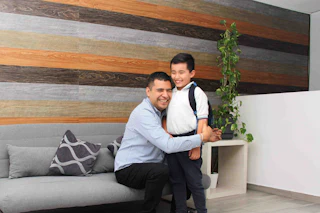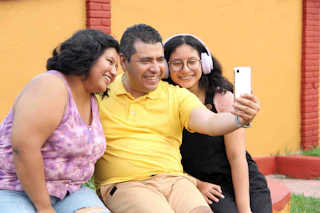Raising Body-Confident Kids: A Parent’s Guide to Understanding Weight Stigma

Imagine this: your child comes home from school, quiet and withdrawn. You ask how their day went, and they shrug. Later, you overhear them say something like, “I’m too fat to play soccer,” or “I wish I looked like the kids on TV.” Your heart sinks.
As parents and caregivers, we want our children to feel proud of who they are. We want them to be healthy, not just physically, but emotionally and socially too. But in today’s culture, where appearance is often linked to value, many young people are exposed to harmful messages about weight and body size from an early age. Sometimes, without meaning to, we send messages that make them feel like their bodies aren’t good enough…and thus, they themselves feel they aren’t good enough.
This is where weight stigma comes in. It’s a form of bias that shows up when people are judged or treated unfairly because of their body size. And it can start at home, even in the smallest ways.
What Is Weight Stigma in Children?
Weight stigma isn’t just about teasing or bullying. It can be subtle, like praising someone for losing weight without the broader context, labeling foods as “bad,” or constantly talking about dieting. It can also be more direct, like telling a child they need to slim down or making jokes about someone’s size.
Kids pick up on these messages quickly. They hear them in conversations, see them in media, and sometimes even feel them in how we treat ourselves. When they do, they start to believe that their worth depends on how they look.
Why Weight Stigma Matters for Kids’ Health and Confidence
Weight stigma doesn’t just hurt feelings; it can shape how children see themselves for years to come. It can lead to:
- Low self-esteem and anxiety
- Depression
- Avoidance of physical activity or healthcare
- Unhealthy eating habits
- Social withdrawal or isolation
- Long-term body dissatisfaction
- Long-term feelings of low self-worth

But here’s the hopeful part: you have the power to change this. A supportive, stigma-free home can help kids build resilience and confidence, even when the outside world sends harmful messages.
Breaking Down the Myths
❌Myth: Weight equals health.
✅Truth: Health isn’t just about size. It includes things like sleep, nutrition, movement, and mental well-being.
❌Myth: Talking about weight helps kids make better choices.
✅Truth: It often leads to shame and secretive behavior.
❌Myth: Restricting food is the answer.
✅Truth: Kids need balanced meals and freedom to listen to their hunger, not guilt or control.
❌Myth: Smaller bodies mean discipline. Larger bodies mean laziness.
✅Truth: Body size is influenced by genetics, stress, and many life factors. It doesn’t reflect effort, worth, or character.
❌Myth: Shaming someone about their weight will motivate them to change.
✅Truth: Shame doesn’t promote healthy behavior. It fosters anxiety, disconnection, and self-hatred. Positive support and acceptance are far more effective in helping kids make healthy choices.
How Parents Can Build Body Confidence at Home
You don’t need to be perfect; you just need to be aware. Here are some ways to create a home that supports body confidence:
- Talk about health, not size.
Focus on how food gives energy and how movement helps us feel strong. - Model self-respect.
Instead of saying “I hate my stomach,” try “I’m grateful my body helped me get through today.” - Celebrate all body types.
Show your kids that bodies come in many shapes and sizes. Talk about what our bodies do for us, rather than what they look like. - Avoid labeling foods.
Teach kids that all foods can fit into a balanced diet. No food should be “bad.” Try calling them "sometimes" foods instead. - Be mindful of your own habits.
Kids notice how you treat your body. Show them what self-care looks like. - Use kind, neutral language.
If you need to talk about size, use terms like “person in a larger body”. - Talk about media messages.
Help kids understand that ads and shows often show unrealistic body types.
Have Honest Conversations
Talking to kids about bodies and health doesn’t have to be scary. Keep it simple and kind.
- “All bodies are good bodies.”
- “Our bodies need different foods to grow strong.”
- “Let’s listen to how our bodies feel after we eat or move.”
If your child asks about weight, be honest but gentle. Remind them that everyone’s body is different, and that’s okay. Help them think critically about what they see online or hear from friends.

Building Confidence That Lasts
Here’s how you can help your child feel strong and proud in their body:
- Celebrate what their body can do.
“You ran so fast!” or “You climbed that hill with strength!” - Let them express themselves.
Support their clothing choices and hobbies without linking them to appearance. - Be there when they’re hurting.
If they face teasing or feel down, listen and remind them of their worth. - Encourage self-compassion.
Teach them to speak kindly to themselves, just like they would to a friend.

Raising body-confident kids doesn’t mean ignoring health. It means redefining it by teaching children that health is about how we feel and function, not how we look. It means showing them that they are valuable, lovable, and strong, just as they are.
So, the next time you catch yourself making a comment about your own body, pause. Ask yourself: “Is this how I want my child to talk about themselves?” Small shifts in how we speak, act, and think can make a big difference.
Together, we can raise a generation that knows the truth: All bodies are good bodies.
Looking for more tools to support your child’s health and confidence? Visit Greaux Healthy’s parent resources for guides and tips.